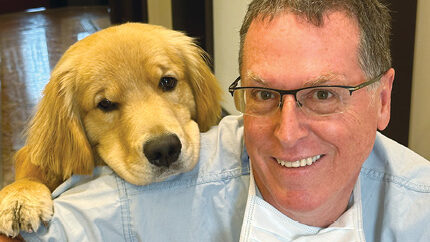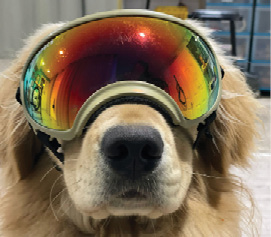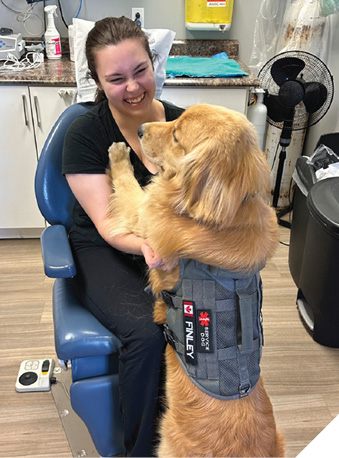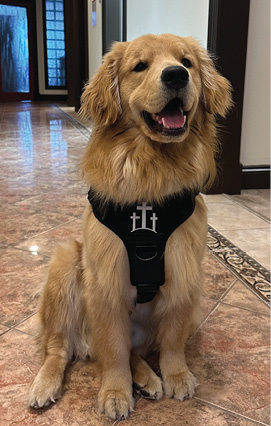
Background
In the ever-changing world of healthcare, innovation often arises from blending diverse fields and exploring unconventional approaches. Dr. Louis Bourget exemplifies this with his groundbreaking work at the crossroads of medicine, physiology, and veterinary science. With a strong foundation in physiology and extensive experience in areas such as dental surgery and facial reconstruction, Dr. Bourget has embarked on a revolutionary mission: integrating Medical Scent Service Dogs into healthcare. These highly trained dogs use their exceptional sense of smell to detect cortisol levels in patients, providing a unique method to reduce stress before, during, or after medical procedures. By pushing the boundaries of medical innovation, Dr. Bourget not only enhances patient care but also inspires the healthcare industry to embrace creative solutions that have the potential to drive transformative change.
Finley, our Medical Scent (cortisol) Service Dog in training, is learning to go see patients that have high cortisol levels pre surgery. Once found, he will go to them, stay with them, be touched, and this will hopefully decrease the patient’s cortisol level before surgery and, thereby, decrease post-operative issues. I am often asked to explain why we have a service dog specifically task trained to seek cortisol, which is such an important medical scent in a surgical clinic or environment.
Physical stress stimulates the hypothalamic-pituitary-adrenal (HPA) axis and sympathetic nervous system. This creates the release of cortisol, which has various physiologic effects, including catecholamine release, suppression of insulin, mobilization of energy stores through gluconeogenesis and glycogenolysis, suppression of the immune-inflammatory response, and delayed wound healing. Wound healing is also delayed through effects on collagen synthesis.

Preoperative surgery anxiety (i.e., high cortisol level) can cause several physical changes in the body. These include increase in the release of hormones; increase in body temperature; episodes of tachycardia, electrolyte and fluid imbalance; hypertension; reduced immune response, and increased wound healing time. Research has also shown that pre- and post-surgery anxiety can increase the level of postoperative pain as well as decrease healing. That is, the higher a person’s anxiety before the surgery, the more pain and discomfort and complications can be seen during the recovery process.
Many methods have been used to decrease anxiety. These include help to gather information about the surgery beforehand; talking about anxieties with family, friends, and healthcare professionals; relaxation techniques including box breathing, yoga, meditation, and exercises; listening to music before surgery; having cognitive behavioral therapy before surgery; aromatherapy; and acupuncture. Medication tends to be the first line of defense for surgeons/physicians/dentists since we all recognize that decreasing preoperative anxiety is essential to a good post op recovery.

Medical Scent Service Dogs that can detect cortisol are now being looked at as a non-pharmacological way to improve post op outcome. Emotional support animals (ESA) have shown to help with anxiety.
Research has shown that simply petting a dog lowers the stress hormone cortisol, while the social interaction between people and their dogs increases levels of the feel-good hormone oxytocin (the same hormone that bonds mothers to babies).
Now a service dog extensively trained for a specific task as well as public obedience, that can detect cortisol level and decrease pre-operative anxiety, would be the next level in helping surgical patients with anxiety and help with surgical outcome, all of this without medication.
Medical Scent Service Dogs helping patients with anxiety, autism, etc. to get ready for surgery and helping post operative outcomes, what a novel idea, something we are working on to prove in time.
Recently we just had another example on how our SDiT has helped few patients.

A young girl was scheduled to have her four impacted wisdom teeth removed under IV sedation. She suffers from anxiety, ADHD, and mood disorder. She smokes over 5 g of cannabis daily to help with her anxiety. She takes Concerta, clonazepam, and venlafaxine as her medication.
She was so nervous entering the office. Our SDiT dog Finley was with another patient. When she entered the office and the surgical area, Finley left the other patient and went to see this young woman. He immediately went to the chair and placed his paws on her. She was able to pat him and felt so much better. She felt a wave of decrease in her stress and explained that this was the best thing and what she needed. Her blood pressure reduced from 180/100 to 113/74 after a few minutes with Finley. We performed her surgery; she was calm and Finley stayed with her until the end.
I am often asked if an Emotional Support animal (ESA) would do the same? Yes, they would; the difference is that our Medical Scent Service Dog in training recognized the cortisol level in this young girl and went to her, alerting all of us of the degree of stress she was under. This is what these dogs train for – the extreme, the patients that really have high cortisol level pre surgery. With a more normal “cortisol level” or level of anxiety, patients tend to do much better during and after surgery. 
Oral Health welcomes this original article.
Learn more about Finley at servicedogfinley.ca.
About the author

Dr. Louis Bourget, swimmer, sailor, past paramedic in the early 1980’s. He received his Bsc in Physiology in 1983, Msc and PhD at McGill University by 1986 and DMD at the McGill University completed in 1990. He also completed year of medical/dental internship in Montreal children’s hospital. Dr. Bourget completed Oral and Maxillofacial surgery at Dalhousie University in Halifax in 1995 (Msc) and received his FRCD in the same year. He spent some time in France doing a fellowship in Cleft Lip and Palate reconstruction and Facial esthetic and completed a facial cosmetic fellowship in North Carolina. He also completed his fellowship in laser surgery and medicine.












